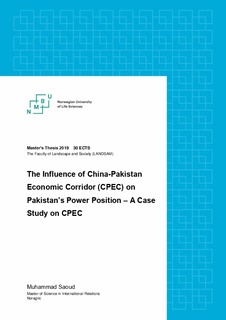| dc.description.abstract | Geographically position plays a crucial role in states power ambitions. Sometimes geographical positions attract to other regional economic powers to use neighboring state strategic importance locations for their own strategic and economic benefits. Pakistan blessed with geographically an important location in South Asia, surrounded by many important countries. China the world 2nd largest economy, willing to reach in the energy-rich region; Gulf states, and towards the European and African markets and their natural resources. China-Pakistan Economic Corridor (CPEC) not even provides the shortest route to China in the Gulf region, but these mega-billion projects have the potential to influence Pakistan's national power elements. National power elements are a combination of hard and soft power elements. The CPEC has potential to increase Pakistan's hard and soft power elements. Hard power elements are geography, population, military, and economy. And soft power came through three sources, political values, culture, and foreign policies. Pakistan's weak and unstable economy, influence to remaining hard power elements. Due to a weak economy, 6th largest population and military are more behind, in term of prosperity and advanced technologies. The major investment brought in the shape of CPEC, which can play a crucial role to boost Pakistan's weak economy. Economic stability can play an important role to enhance remaining hard power elements, population, and military. Along with economic stability, the important location provided opportunities to Pakistan for enhancing its soft power capability. Pakistan's hard and soft power capabilities provided a significant platform to Pakistan for using smart power strategies. This study has described influence of CPEC on Pakistan’s hard, soft and smart power. | nb_NO |

